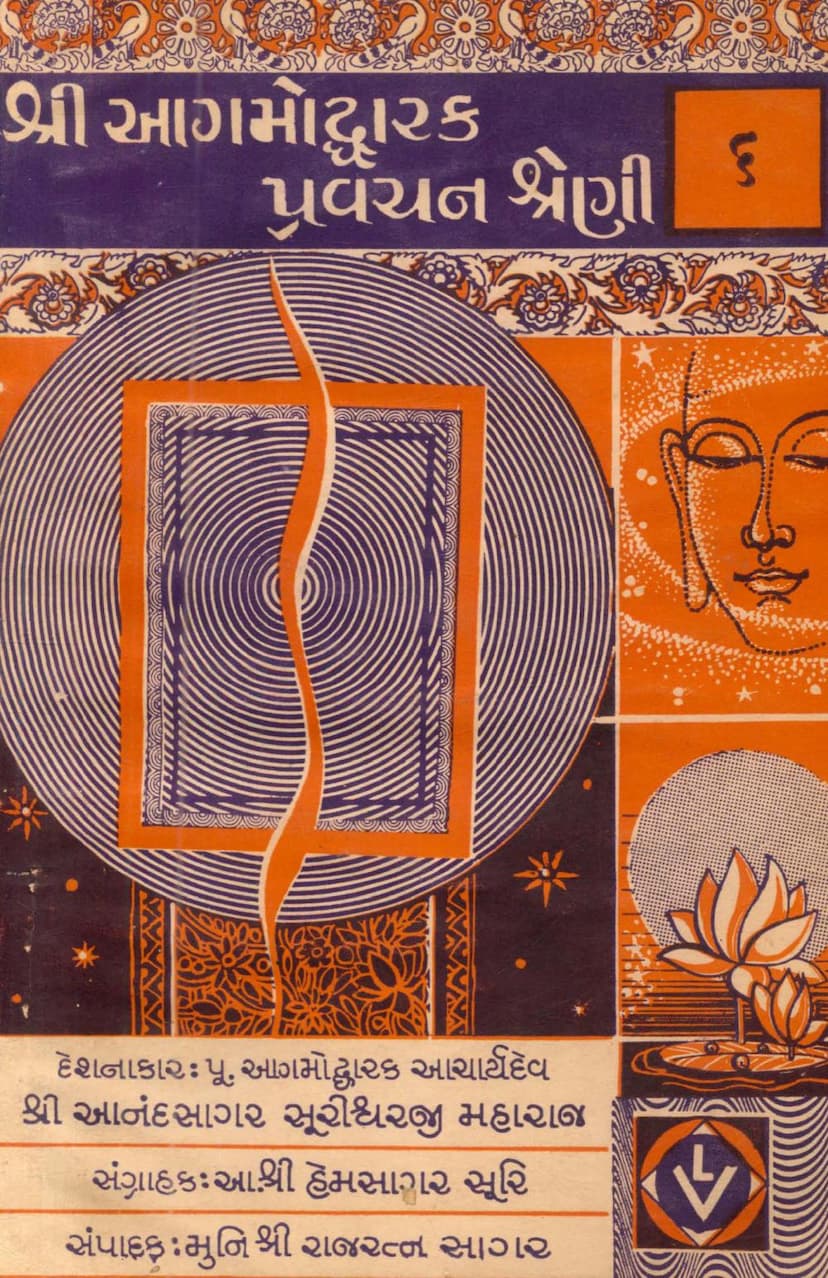Agamoddharak Pravachan Shreni 186 To 236
Added to library: September 1, 2025

Summary
The provided text is a collection of Jain religious discourses, specifically lectures or pravachans, delivered by Acharya Shree Anand Sagarsuri Maharaaj and compiled by Aagri Hemsagarsuri and Muni Shree Rajratna Sagardji. It is part of the "Agamoddharak Pravachan Shreni," published by Anand Hem Granthmala. This particular volume, "Agamoddharak Pravachan Shreni," Vibhag 6, contains lectures 186 to 236.
Here's a comprehensive summary of the key themes and content covered in the text, based on the provided pages and the table of contents:
Core Jain Philosophy and Concepts:
- Nature of Reality (Tattva): The discourses delve into the fundamental principles of Jainism, including the nature of jiva (soul) and ajiva (non-soul), karma, bandha (bondage), nirjara (liberation), moksha (salvation), and the cyclical nature of existence (samsara).
- Pudgala (Matter): A significant portion of the lectures is dedicated to explaining pudgala, its properties, transformations (parinaman), and its role in the formation of bodies and the karmic process. The text emphasizes the subtle nature of pudgala and its pervasiveness.
- Karma: The discourses detail how karma attaches to the soul, its various types, their effects, and the process of bandha (bondage) and nirjara (shedding of karma). The interaction between the soul and karma is a recurring theme.
- Soul (Jiva): The eternal and inherent nature of the soul, its potential for liberation, and the obstacles (karma) that prevent its full realization are discussed. The distinction between the soul's true nature and its conditioned states due to karma is highlighted.
- Jain Ethics and Practices: The text emphasizes the importance of ahimsa (non-violence) in thought, word, and deed. It discusses the necessity of right faith (samyaktva), right knowledge (samyagjnana), and right conduct (samyagcharitra) for spiritual progress. The discourses also touch upon the observances of householders (shravaka) and ascetics (sadhu), including the significance of vows, austerities (tapas), and meditation (samayika).
- Cosmology and Beings: The text describes the Jain cosmology, including the various realms of existence such as hellish beings (naraki), heavenly beings (deva), and the cycle of rebirth through different species and states of existence. The suffering of hellish beings is vividly depicted.
- The Nature of God/Tirthankaras: Jainism does not believe in a creator God. Instead, it venerates the Tirthankaras and Siddhas (liberated souls) as perfect beings who have attained omniscience and shown the path to liberation. The discourses explain the qualities of these supreme beings and their role as guides.
Specific Content from the Discourses (Lectures 186-236):
- Bhagavati Sutra: Lectures 186 to 233 are based on the 8th Shatak (chapter) of the Bhagavati Sutra, a major Jain scripture. This section likely covers profound philosophical discussions, particularly related to pudgala and its transformations, as indicated in the table of contents.
- ChauMasi Pravachans: Lectures 234 to 236 are identified as ChauMasi Pravachans, which are discourses given during the Chaturmas (a four-month monastic retreat). These may cover topics relevant to the specific period or broader spiritual themes.
- Dharma Ratna Prakaran: A summary of discourses on the Dharma Ratna Prakaran is included. This text likely deals with the virtues and principles that constitute true Dharma.
- Naraki and Their Sufferings: A specific section is dedicated to the hellish realms and the profound suffering experienced by beings in those states.
Key Arguments and Examples:
- The Problem of Causality and Free Will: The text explores how actions lead to consequences, with an emphasis on individual responsibility for karma, rather than divine intervention.
- The Subtlety of Jain Philosophy: The discourses highlight the intricate and nuanced explanations of Jain philosophy, particularly concerning the nature of pudgala and its transformations, which are often difficult for ordinary minds to grasp.
- The Importance of Right Knowledge: The text stresses that true spiritual progress is not merely about external rituals or austerities but relies heavily on right knowledge (samyagjnana) to understand the true nature of reality and soul.
- The Role of Devotion and Penance: While emphasizing self-effort, the text also acknowledges the role of devotion and penance in spiritual growth.
- Critique of Other Philosophies: The discourses implicitly or explicitly distinguish Jain teachings from other Indian philosophical systems, particularly concerning the concept of a creator God and the nature of the soul.
- Examples and Analogies: The lectures use various examples and analogies from daily life, mythology, and nature to illustrate complex philosophical points, making them accessible to the audience. Examples like the potter's wheel, the nature of sunlight, the journey of a lost child, and the qualities of different animals are used.
- The Nature of the Soul's Attachment: The text likely explores how the soul becomes entangled with karmic matter and how through right knowledge and conduct, it can shed this attachment and attain liberation.
- The Importance of Right Conduct: The discourses likely detail practices and ethical guidelines that lead to the shedding of karma and the realization of the soul's true, pure nature.
Compilation and Publication:
- The text is presented as a compilation and editing effort, indicating that the discourses were transcribed and organized for wider dissemination.
- The publisher is Anand Hem Granthmala, and the volume is identified as "Pushpa - 23."
- The publication details mention multiple editions, indicating the text's popularity and the ongoing effort to preserve and propagate these teachings.
In essence, the "Agamoddharak Pravachan Shreni" Volume 186-236 provides a detailed exposition of core Jain philosophical tenets, focusing on the nature of matter, karma, the soul, and the path to liberation, all presented through the profound spiritual insights of Acharya Shree Anand Sagarsuri Maharaaj.